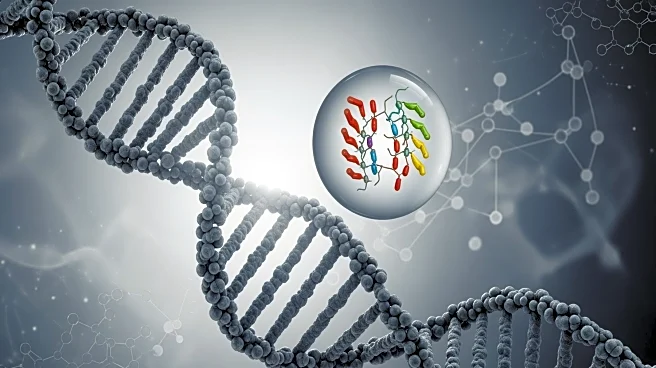What's Happening?
Researchers from the Research Center for Molecular Medicine of the Austrian Academy of Sciences, in collaboration with the University of Oxford, have discovered a new role for the enzyme NUDT5 in cellular
metabolic balance. Traditionally known for its enzymatic activity in breaking down nucleotide derivatives, NUDT5 has been found to act as a molecular scaffold that regulates purine production, a key component in DNA synthesis. This discovery was made through studies on cells with mutations in the MTHFD1 gene, which is crucial for folate metabolism. The enzyme interacts with PPAT, another enzyme involved in purine synthesis, and restrains its activity when purine levels are high, thus preventing excessive purine production.
Why It's Important?
The findings have significant implications for understanding cellular metabolism and its impact on health. By revealing NUDT5's structural role in purine synthesis regulation, the study provides insights into how cells maintain metabolic balance and respond to environmental changes. This mechanism could explain resistance to certain cancer drugs, as cells lacking functional NUDT5-PPAT interaction show reduced sensitivity to treatments like 6-thioguanine. Additionally, the research links folate metabolism, purine synthesis, and diseases caused by MTHFD1 deficiency, potentially informing new therapeutic approaches for related disorders.
What's Next?
The study opens avenues for further research into metabolic control mechanisms and their implications for drug resistance and disease treatment. The development of a chemical degrader, dNUDT5, by collaborators at Oxford, allows for selective elimination of NUDT5 from cells, providing a tool for deeper investigation into the pathway. This could lead to strategies for protecting healthy cells from chemotherapy side effects and enhancing cancer treatment efficacy.
Beyond the Headlines
The discovery challenges traditional views of enzyme functions, highlighting the importance of structural roles in cellular processes. Understanding the non-enzymatic functions of proteins like NUDT5 could lead to novel approaches in drug design and metabolic regulation, with potential applications in treating metabolic disorders and improving cancer therapies.












